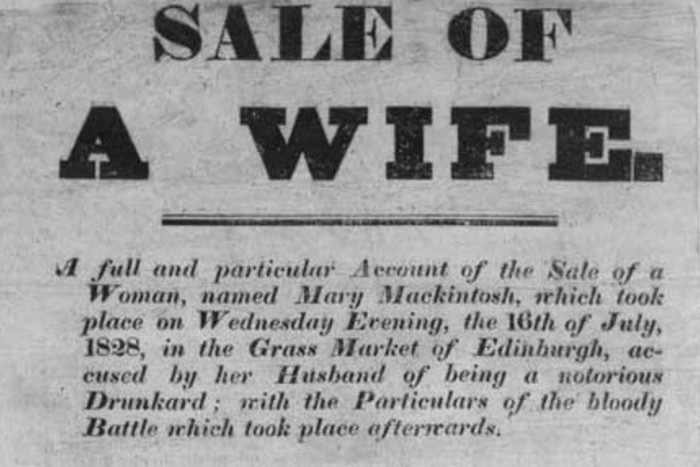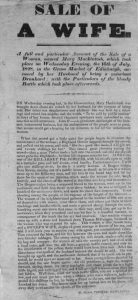
A wonderful story from a broadside (early version of a newspaper) from 1828, about a man who was auctioning off his drunken wife at the Grassmarket in Edinburgh. Details of the extraordinary auction are held by the National Library of Scotland in its vast collection of broadsides, single newssheets which were distributed or pinned up around towns and cities. These were the tabloids of the time.
Mary Mackintosh was brought to the Grassmarket by her husband, Thomas M.Guisgan, who held her by a straw rope tied around her middle with the words “to be sold by public auction” pinned on her bosom. She was accused of being a notorious drunk and an adulterer but when the sale got underway on July 17 1828, a “bloody battle” broke out with punches thrown and people whacked with stones wrapped in stockings.
It had started out civil enough. Several thousand spectators had assembled to witness this novel sale, held around 6pm, with the auctioneer, described as a “knight of the hammer”, wrestling for attention above the rowdy crowd. According to a report of the day, quietness fell as people started to note the “countenance of the woman”.
Stepping through the crowd, a man pulled his wallet and said: “She be a good like lassie, l will gi’e ten and twenty shillings for her.” The crowd cheered at the offer but it was not long before “a stout tinker” made a bolt to the front of the crowd to say she should never go to the Highlands before offering a six pence. The clamour of the crowd heightened further. The next bid was quick to follow and came from a “Killarney Pig Jobber” whose “mouth open as wide as a turnpike gate”. Half drunk, he offered two shillings more, given she was a “pratty” – or mischievous – woman. It was at this stage that the atmosphere started to tilt. A brogue maker emerged from a public house “as drunk as 50 cats in a wallet – and hit the Killarney man, leaving him knocked out on the ground for a good 10 minutes. Mary Mackintosh is said to have “laughed heartily” at the punch with the cheers of the crowd now “long and incessant”. But the scene rapidly deteriorated as bare knuckle violence broke out, much of it executed by women armed with stones. First, however, the Brogue maker walked up to the auctioneer. A report of the day said:
“He was so enraged, he knocked the auctioneer down, and made his claret flow desperately.”
The women of the neighbourhood gathered to the number of 700, and armed themselves with stones, some threw them, and others put them in their stockings and handkerchiefs, and made a general charge through the mob, knocking every one down that came in their way, until they got up to the auctioneer, when they scratched and tore his face in a dreadful manner, in consequence of the insult the fair sex had received. One woman, described as a “true female hero” and the wife of a sweep, pelted Mr Guisgan, the man who had tried to sell his wife, before decrying him as a “contaminated villain”. Mr Guisgan hit her back between her eyes, leaving them like “two October cabbages.” The report added: “A general battle ensued, and only for the interference of the police, there would have been lives lost.”
After the disturbance was quelled, the husband continued to insist she should be sold. According to report, she was brought up again before the crowd and an elderly Jack Tar – a term used for seamen of the Merchant or Royal Navy, stepped forward. He described Mary Mackintosh as “well rigged” before offering half a Crown more than the last bidder. But he was to be outbid by a farmer, described as a widower, who pledged two pounds and five shillings for Mrs Mackintosh. The sale was agreed. The report concluded: “The farmer took her up behind him on his horse, and away they went amidst the cheers of the populace.”
Full Transcript of Original Article
Transcription
SALE OF A WIFE.
A full and particular Account of the Sale of a Woman, named Mary Mackintosh, which look place on Wednesday Evening, the 16th of July, 1828, in the Grass Market ‘of Edinburgh, accused by her Husband of being a notorious Drunkard; with the Particulars of the bloody
Battle which took place afterwards.
ON Wednesday evening last, in the Grass-market, Mary Mackintosh was brought down about six o’clock by her husband, for the purpose of being sold. Her crime was drunkenness and adultery. She was held by a straw rope tied round her middle, and the words, ” To be sold by public auction” in front of her bosom. Several thousand spectators were assembled to witness this novel occurrence. John F——n, pensioner, and knight of the hammer, commenced business, but the acclamations of the people were so great, that no one could get a hearing for ten minutes, to bid for the unfortunate Woman;
When, the crowd got a little quiet the people began to examine the countenance of the woman ; a Highland Drover stepped through the crowd, and pulled out his purse, and Said, ” She be a good like lassie,’l will gi’e ten and twenty shillings for her.” This caused great cheering among the
crowd? then a stout Tinker made a bolt into the crowd, and said she should never go to the Highlands – he then bid sixpence more for her. At this time, one of the KlLLARNEY PIG JOBBERS, with his mouth open as wide as a turnpike gate, and half drunk, eried loudly, FAUGHAHOLLICE , I will
give two shillings more, for she is a pratty woman. A Brogue maker, from Newry, coining out of a public house; as drunk as 5O cats in a wallet, came up to the Killarney man, and hits him in the bread bag, and he lay there for the space of ten minutes, which made the woman for sale, laugh
heartily, and the cheers of the crowd at this time was long and incessant.?
The Brogue-maker being a supposed friend to the woman, went up to the auctioneer, and told him there were three bidders: he was so enraged, he knocked the auctioneer down, and made his claret flow desperately. Great cheering among the people, at the expense of the knight of the hammer.?
The women of the neighbourhood gathered to the number of 700, and armed themselves with stones, some threw them, and others put them in their stockings and handkerchiefs, and made a general charge through the mob, knocking every one down that came in their way, until they got up to the
auctioneer, when they scratched and tore his face in a dreadful manner, in consequence of the insult the fair sex had received. One resolute woman came up with a stone and knocked down Thomas M.Guisgan, husband to the woman who was exposed for sale. This woman, a true female hero,
and a SWEEP’S WIFE, displayed great courage in favour of her sex, and said I will learn you to auction your wife again, you contaminated villain Tom returned the blow, and hit her between the eyes, and made them like two October cabbages. The sweep seeing his wife struck, made a sally with his bag and scrapper ; the women all took the sweep’s part, and cried with a loud voice, mill him the old boar, a general battle ensued, and only for the interference of the police, there would have been lives lost. Alter the disturbance was quelled, the husband insisted she should be sold. She was brought up again, and the auctioneer declared that if he could not be protected, be would have no more call to her. Some young fellows shouted he should, and the sale began again. An old pensioner, a Jack tar, stepped forward, saying, damn my tarry top-lights and chain plates she is a tight little frigate, and well rigged too, and I will give half a crown more than the last bidder. Well done, cried the mob to the sallor, you are a spirited fel-
low, and you must get her; when a farmer, who was a widower, bade two pound five shillings for her, he being a friend to the sex, and the auctioncer knocked her down. The farmer took her up behind him on his horse, and away they went amidst the cheers of the populace.
W. BOAG, PRINTER, NEWCASTLE.


Thank you gor sharing this article. I found it quite fascinating!
Very interesting and quite humorous!